Now 54-year-old David Cameron gets his Covid jab after ‘getting a call from his GP’ – even though roll-out in England has only just been officially expanded to over-60s
- Mr Cameron said he was ‘proud’ to have received the jab and hailed the NHS
- Unclear why he was jabbed, given rollout only supposed to target over-60s
- Comes after Theresa May – 10 years his elder – and Tony Blair, 67, got theirs
Former Prime Minister David Cameron got his Covid vaccine today — despite not being in his sixties.
The 54-year-old said he was ‘proud’ to have received the jab and hailed the NHS for its ‘deeply impressive’ roll-out.
He tweeted a photograph of himself being injected at a clinic, understood to be in London, adding: ‘Huge “thank you” to our brilliant NHS and all the amazing staff.’
His successor Theresa May – 10 years his senior – tweeted about being jabbed on Friday while Tony Blair, 67, revealed he got his first dose on February 20.
It’s unclear why Mr Cameron was invited for the jab, given that the programme was only officially expanded to people over 60 on Monday.
Local vaccination teams have been moving down through the age groups if they are ahead of schedule or if not enough people higher on the priority list come forward.
The latter has been a particular problem in London, where uptake has lagged behind the rest of the country. Vaccine hesitancy among black, Asian and ethnic minority (BAME) groups is thought to be behind poorer rates in the capital’s culturally diverse boroughs.
Representatives for Mr Cameron, who lives in Holland Park, West London – but also has a home in the Cotswolds, said he did not have an undisclosed health condition and that he ‘got the call in the normal way and went as soon as he could’.
It will nonetheless fuel concerns that the vaccine roll out has become a ‘postcode lottery’. Healthy people in their twenties and thirties have already been jabbed in some parts of the country.
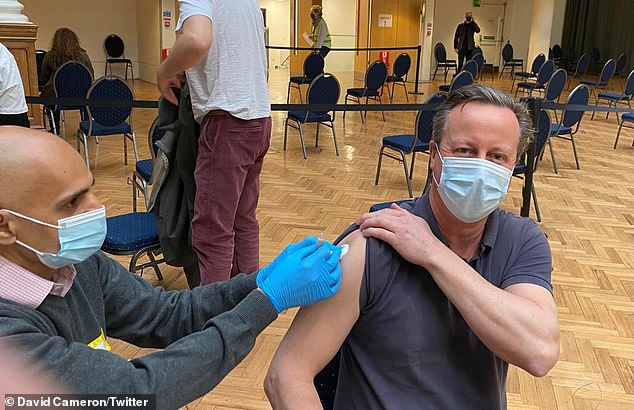
David Cameron today became the latest former Prime Minister to get a coronavirus vaccine
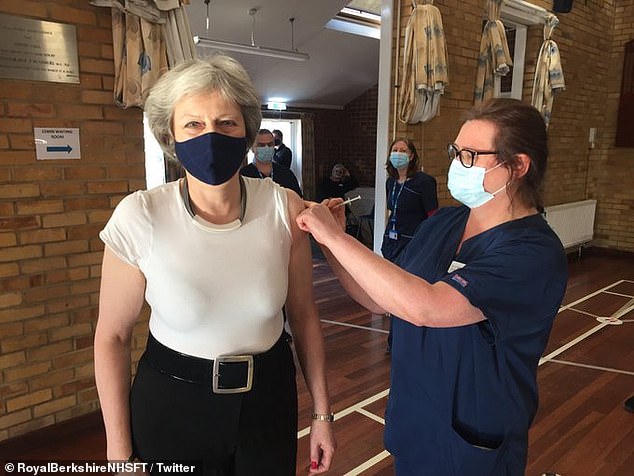
His successor Theresa May – 10 years his elder – tweeted about being jabbed on Friday
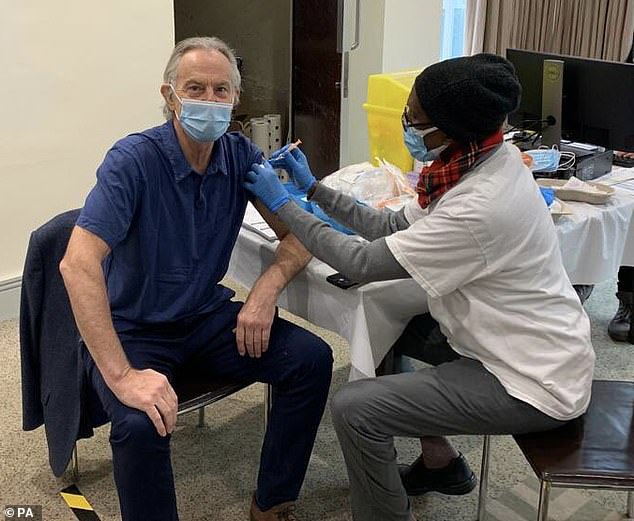
For Labour leader and Prime Minister Tony Blair, 67, revealed he got his first dose on February 20
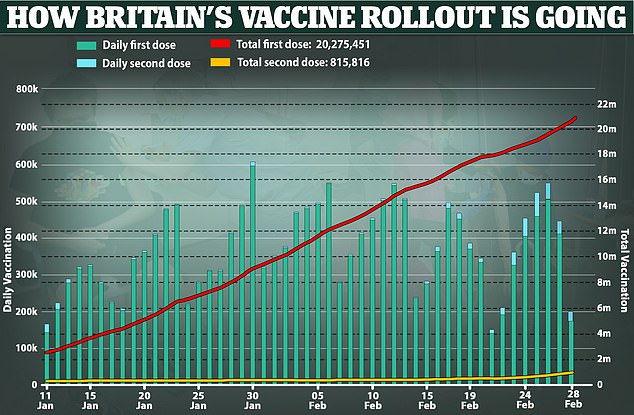
More than 20million Britons have now received their first dose of Covid vaccines, and about 800,000 people have been given both injections
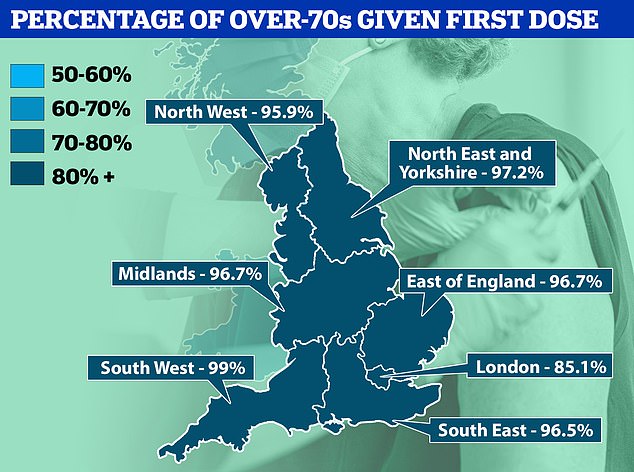
Mr Cameron tweeted: ‘Huge “thank you” to our brilliant NHS & all the amazing staff & volunteers working on the UK’s deeply impressive vaccine programme.
‘I was proud to have my jab this morning & encourage everyone to take theirs when the call comes – it’s crucial we look after ourselves & each other.’
It came after Theresa May shared a photo during her vaccination on Friday. She also made a plea for Brits to come forward for the jab.
She tweeted afterwards: ‘I just had my first Covid-19 jab. It is safe, effective & painless. When it’s your turn, please #TakeTheVaccine. Only by protecting each other can we defeat this virus.
‘Thanks to all the brilliant researchers, volunteers, NHS & military personnel for their truly heroic efforts.’
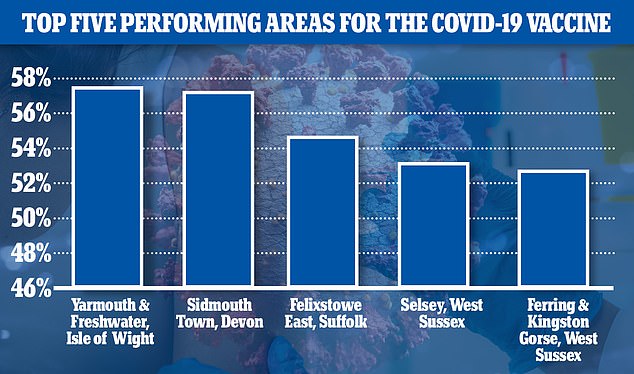
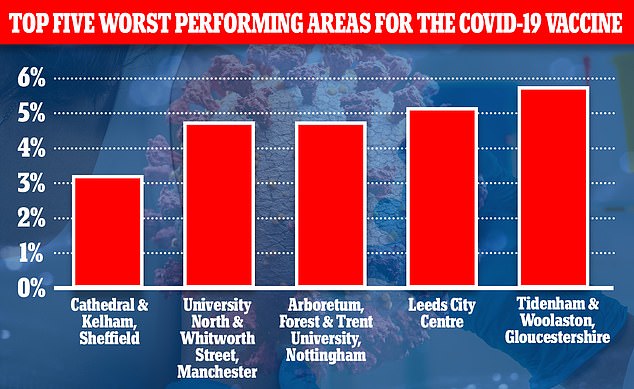
By the end of the week everyone in the top seven priority groups – which includes everyone above 60, clinically vulnerable younger people and those with underlying conditions – will have been offered a jab.
NHS England said the programme, which has been proceeding at breakneck speed, will then move to offer vaccinations to around 5million people in their 50s as soon as next week, which should take two weeks to deliver.
With about 2.5million people receiving their first dose of the vaccine per week, Britain is on course to offer jabs to everyone over the age of 50 by the week beginning March 15 – almost a month before its target – with the over-40s then expected to receive invitations later this month.
More than 20million people in the UK have now been given their first dose of a vaccine in total and 800,000 have received both injections.
But there are still lingering concerns that the rollout has become a postcode lottery.
MailOnline’s analysis of latest NHS figures, which go up to February 21 and were published on Thursday, show 90.3 per cent of all over-65s in England have had their first dose, with rates varying wildly across the nation.
The data — based on Office for National Statistics population estimates — suggests that 15 areas of the country have already immunised at least half of all their residents.
Yarmouth and Freshwater on the Isle of Wight topped the pack, dishing out 5,451 first doses. This would give it an uptake rate of 57.5 per cent, given that the area it is estimated to be home to 9,487 people.
But 77 districts have vaccinated fewer than 10 per cent of residents, data suggested. Urban areas in northern cities performed worst, with Cathedral and Kelham in Sheffield jabbing just 3.19 per cent of all its 21,171 residents. It was followed by University North and Whitworth Street in Manchester (4.8 per cent), Arboretum, Forest and Trent University in Nottingham (4.82 per cent) and Leeds City Centre (5.19 per cent).
Rates can vary because of population breakdowns, with the roll-out currently only just on NHS workers, over-65s, care home staff and residents and the seriously vulnerable. For example, younger people tend to live in cities so they would rightly have lower vaccination rates.
Figures also revealed just 71.5 per cent of care home staff have been given a first dose of the vaccine. But the rate is barely over 50 per cent in London, where the roll-out is lagging behind.
Meanwhile, Public Health England last night published its first major real-world analysis of the impact of the Pfizer and Oxford University vaccines on the UK’s epidemic.
The hugely encouraging data showed a single shot of either vaccine cut hospital rates in the over-80s by 80 per cent and stopped six in 10 people in the same age group from getting ill.
The PHE data also suggests the Pfizer/BioNTech vaccine, which was the first to be approved and rolled out a month before the Oxford/AstraZeneca jab, leads to an 83 per cent reduction in deaths from Covid.
The team said they could not accurately predict the Oxford jab’s impact on deaths yet, because there had not been enough time and data since it was rolled out.
PHE also assessed protection against symptomatic COVID in those over 70. It found four weeks after the first jab, efficacy ranged between 57 to 61 per cent for the Pfizer vaccine and 60 to 73 per cent for the Oxford vaccine.
